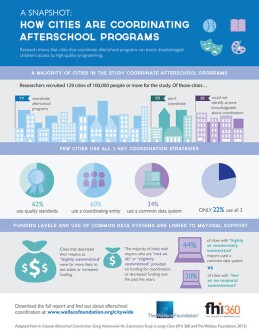Cross-posted from Learning Without Limits.
Turns out that working together is something that afterschool providers can work on, a new study suggests.
Based on an examination of 100 large cities, it finds that while citywide coordination of afterschool programs is on the rise, many cities should do more on this front. The study, conducted by FHI 360, a nonprofit education research group, also argues that mayoral support is crucial to expanding and improving those programs.
“Historically, the afterschool field has been decentralized with programs, schools, city leaders, and funders operating separately from each other,” said Ivan Charner, the vice president and director of FHI 360, in a news release. “Yet we found many positive steps have been taken to coordinate afterschool programs in large cities across the country. If this trend continues and afterschool coordination truly goes nationwide, we believe that more children will have access to and participate in high-quality afterschool programs.”
The study finds that more than three quarters of the U.S. cities surveyed said they are increasing coordination in afterschool programs in an effort to improve and expand services for children in need. The researchers targeted cities with populations exceeding 100,000 residents, but did not identify them by name in the study.
Data collected also indicate that support from city managers and mayors is crucial to sustained funding, and that cities that describe their mayors as “highly committed” to afterschool coordination were far more likely to see funding for those programs remain stable.
Other findings include:
- About one-third of cities contacted are using a common data system to collect information about programs and participants.
- Funding for coordination of programs has decreased in 34 percent of contacted cities over the past five years. It was stable in 24 percent of cities but increased in only 9 percent.
- Mayors and city managers were described as “highly committed” to afterschool program coordination in 39 percent of cities contacted and “not committed at all” in 12 percent.
Commissioned by the Wallace Foundation, the study looked at whether cities had adopted particular strategies--such as creating a data system, quality improvement standards and a coordinating entity--that experts say can help the different players in afterschool programs work together. (The Wallace Foundation provides support for coverage of extended and expanded learning in Education Week).
Here’s a handy graphic highlighting some key findings:

